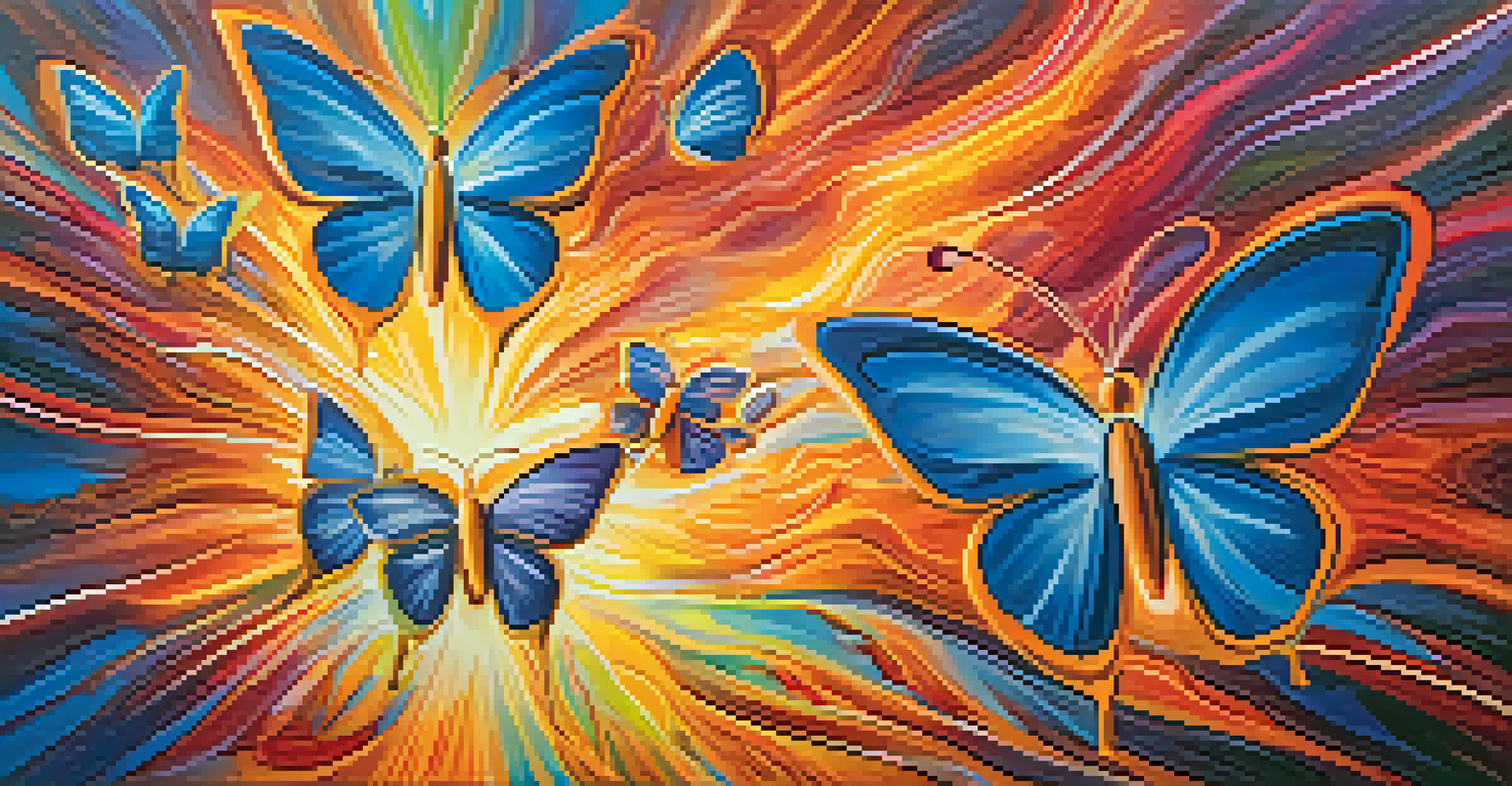Entheogenic Journeys: Healing Grief Through Psychedelic Use

Understanding Entheogens and Their Role in Healing
Entheogens are substances that, when consumed, can induce altered states of consciousness. These include psychedelics like psilocybin mushrooms and ayahuasca, which many find helpful in exploring deep emotional landscapes. By allowing individuals to confront their emotions, entheogens can facilitate profound healing experiences, especially for those grappling with grief.
Psychedelics can help us to see the world in a new light, providing insights that can lead to healing and transformation.
Grief is a complex emotion that can manifest in various ways, often feeling isolating and overwhelming. Traditional therapies can be beneficial, but some individuals might find they need a more profound, transformative experience to process their loss. This is where the unique properties of entheogens come into play, offering a new lens through which to view grief.
Research shows that psychedelics may help to rewire neural pathways, promoting emotional resilience and fostering a sense of connection to oneself and others. In this way, entheogens can serve as powerful allies in the healing journey, providing insights that are often obscured in everyday life.
Navigating Grief: Personal Stories of Transformation
Many individuals have shared personal anecdotes about how entheogenic experiences helped them navigate their grief. For instance, one person described a profound journey where they felt a connection to their lost loved one, leading to feelings of closure and acceptance. Such stories highlight the potential of psychedelics to create a safe space for emotional exploration.

These journeys are often intense and can bring up deep-seated emotions that need to be faced. It’s not uncommon for participants to encounter initial feelings of fear or sadness, but as they move through these emotions, they often emerge with a renewed sense of peace. This transformation can be incredibly validating for those who have felt stuck in their grief.
Entheogens Aid Grief Healing
Entheogens, like psychedelics, can help individuals confront and process grief by inducing altered states of consciousness.
The shared experiences of others can provide comfort and encouragement for those considering their own entheogenic journey. Knowing that others have walked a similar path can inspire hope and foster a sense of community among those grieving.
The Science Behind Psychedelics and Grief Relief
Emerging research is shedding light on how psychedelics work in the brain, particularly in relation to emotional processing. Studies suggest that these substances can enhance neuroplasticity, which is the brain's ability to adapt and change. This is crucial when dealing with grief, as it allows individuals to reshape their emotional responses to loss.
The experience of grief is universal, but the journey through it can vary greatly; entheogens may offer a unique pathway for some.
Furthermore, psychedelics may reduce the fear of death and promote a sense of interconnectedness, which can be incredibly comforting for those mourning the loss of a loved one. Understanding these mechanisms helps demystify the process and reinforces the therapeutic potential of these substances when used responsibly.
While the science is still evolving, the findings so far suggest that entheogens could be a valuable tool in grief therapy. As more studies emerge, we may see a shift in how we approach grief and healing in the context of mental health.
Setting the Stage: Creating a Safe Environment for Journeys
Creating a safe and supportive environment is essential for anyone considering an entheogenic journey. This includes choosing a comfortable space where one feels secure and can fully immerse in the experience. It’s often recommended to have a trusted guide or therapist present to help navigate the emotional terrain.
Safety doesn’t just refer to the physical space; it also encompasses emotional and mental readiness. Individuals should prepare themselves by reflecting on their intentions for the journey, which can help shape the experience. A clear intention can pave the way for deeper insights and more meaningful encounters during the session.
Integration is Key Post-Experience
Proper integration of insights gained during entheogenic journeys is essential for translating those experiences into meaningful healing.
Additionally, post-journey integration is critical. This involves taking time to process the experience, discuss insights with a therapist, and incorporate lessons learned into everyday life. Proper integration can enhance the healing effects and provide a roadmap for moving forward.
Integration: Making Sense of the Entheogenic Experience
Integration is the process of translating the insights gained during an entheogenic journey into everyday life. It’s an essential step that ensures the experience contributes positively to one’s healing process. Without integration, the profound lessons learned may fade away, leaving individuals feeling disoriented.
Finding ways to express the experience—whether through journaling, art, or discussions with trusted friends—can be incredibly beneficial. Many individuals find that sharing their journey helps solidify their understanding and fosters connection with others who may have had similar experiences.
Therapeutic support during the integration phase can also aid in processing emotions that arise post-journey. Professional guidance can help individuals navigate any lingering feelings of grief, ensuring that the encounter serves as a catalyst for healing rather than a source of confusion.
Ethics and Responsibility in Psychedelic Use
As the dialogue around psychedelics grows, so does the importance of discussing ethics and responsibility in their use. It’s crucial to approach entheogens with respect and a clear understanding of their potential risks and benefits. This includes being mindful of the legal status of these substances in various regions, as well as the importance of sourcing them safely.
Education plays a vital role in responsible psychedelic use. Individuals should seek out credible sources of information and consider engaging with experienced practitioners or therapists who can provide guidance. This ensures that the journey is conducted in a safe and informed manner, maximizing healing potential.
Ethical Use of Psychedelics Matters
Approaching entheogens with respect and understanding of their potential risks ensures safe and responsible healing practices.
Moreover, it’s essential to recognize that entheogenic experiences can be deeply personal and may not be suitable for everyone. Personal readiness, mental health status, and the presence of support systems are all factors that should be weighed carefully before embarking on such a journey.
The Future of Grief Therapy: Embracing Entheogens
As society continues to explore alternative healing methods, the integration of entheogens into grief therapy is becoming more accepted. With ongoing research and anecdotal evidence supporting their effectiveness, there’s hope for a paradigm shift in how we approach mental health and grief. This could lead to more compassionate and comprehensive care for those suffering from loss.
The potential for entheogens to reshape our understanding of grief opens up exciting possibilities for therapeutic practices. By incorporating these substances into therapeutic settings, we can create environments that promote healing, connection, and understanding. This could revolutionize how we support individuals navigating loss.

Ultimately, embracing entheogenic journeys as a valid pathway for healing grief may help destigmatize their use and encourage more open discussions about mental health. As we continue to learn from the experiences of others and the science behind these substances, we move closer to a holistic approach to healing that honors both the pain and the beauty of life.